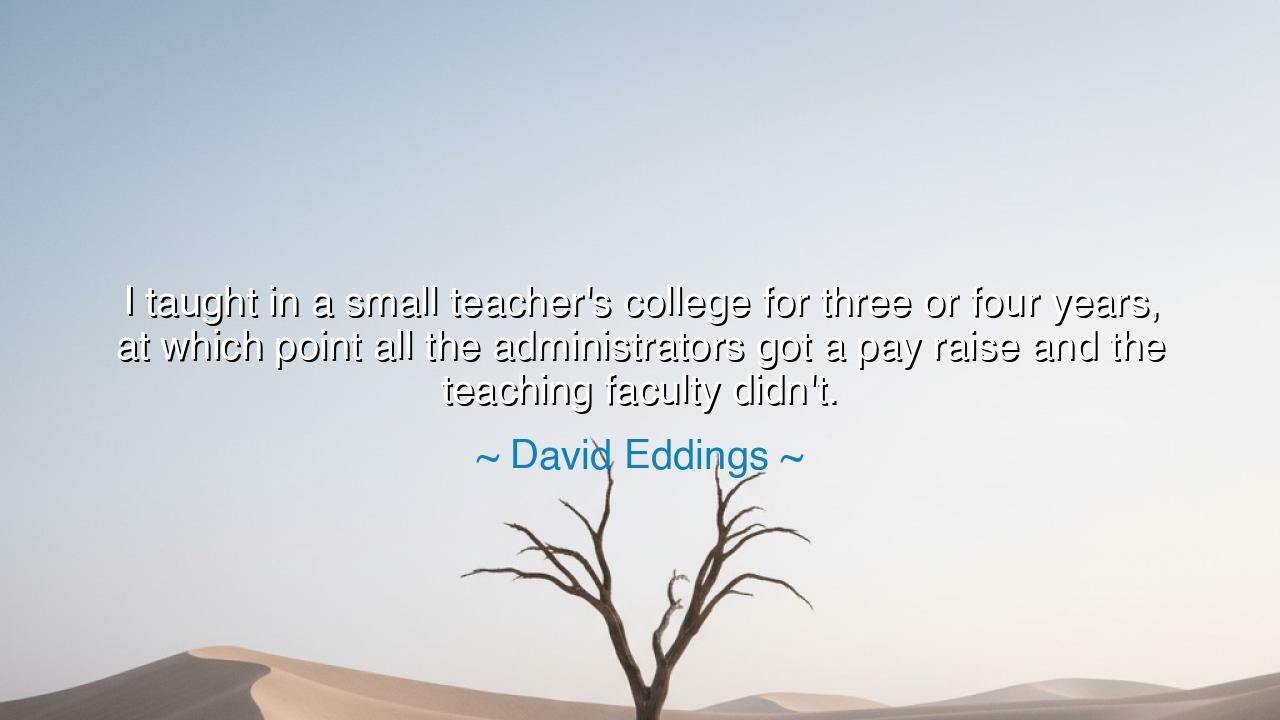
I taught in a small teacher's college for three or four years
I taught in a small teacher's college for three or four years, at which point all the administrators got a pay raise and the teaching faculty didn't.






Hearken, O seekers of justice and the guardians of knowledge, to the words of David Eddings, who recalls: “I taught in a small teacher’s college for three or four years, at which point all the administrators got a pay raise and the teaching faculty didn’t.” In these words lies a reflection on the unequal valuation of labor, the quiet burdens borne by those who dedicate themselves to the cultivation of minds, and the injustices that often accompany institutional hierarchies. The ancients, who chronicled the deeds of rulers and the lives of scholars, knew that such imbalances are as old as civilization itself, and they recorded the moral imperative to honor those who serve the common good.
Eddings’ experience highlights the disparity between those who govern and those who teach, between administrators who hold power and those who labor to impart knowledge, wisdom, and guidance. The teacher, whose hours are spent in classrooms and in preparation, shaping minds and character, receives recognition far less than those who occupy offices and make decisions from afar. This is an ancient dilemma: the value of intellectual and moral labor is often invisible to those who wield authority.
Consider the meaning of this inequity. The faculty bears the primary responsibility for nurturing students’ understanding, for cultivating the skills, curiosity, and ethical grounding that sustain society. Yet the reward—financial, symbolic, and institutional—is disproportionately given to administrators who, though necessary, often do not engage directly in the transformative work of teaching. The ancients would have seen this as a moral imbalance, a warning that societies flourish not through titles or positions, but through honoring the labor that sustains culture and wisdom.
Historical parallels illuminate this truth. Recall Socrates, who devoted his life to the instruction of youth, challenging minds and shaping civic virtue, yet received no material reward or recognition in his lifetime. His teachings, however, laid the foundations for Western thought, illustrating that the work of the teacher, though undervalued in its own era, echoes through the ages with power far greater than the privileges of the administrators or rulers who may have overlooked him.
Eddings’ words also speak to the resilience and integrity of the teaching vocation. To labor without recognition, to continue instructing while others benefit disproportionately, is an act of courage, dedication, and moral steadfastness. The teacher’s reward lies not in material gain but in the growth and enlightenment of students, the legacy of knowledge passed forward, and the cultivation of virtue in future generations. Such endurance is both heroic and noble, a testament to the enduring value of those who teach.
O listener, perceive the lesson here: do not measure the worth of labor solely by the recognition it receives in the moment. True value resides in the impact of one’s work, the lives touched, the minds cultivated, and the wisdom imparted. Honor those who teach, and let their contributions guide the moral compass of society, for they form the bedrock upon which civilizations endure and flourish.
Practical guidance emerges from this reflection. If you are a teacher, continue your work with diligence and integrity, knowing that the fruits of your labor may ripple across generations, even if immediate reward is lacking. Advocate for fairness and recognition, not from vanity, but to uphold the dignity of labor and ensure that future generations of educators are supported and honored. Observe, too, the balance between governance and service, and strive to align institutional power with the moral weight of teaching.
Thus, O seeker, engrave this wisdom upon your spirit: the labor of the teacher is sacred, enduring, and foundational. While the administrators may receive accolades and material gain, the true architects of civilization are those who instruct, guide, and inspire. Let your actions honor the work of teaching, resist injustice where it arises, and recognize that the cultivation of minds and character is a legacy more powerful and eternal than any pay raise or title bestowed by transient authority.






AAdministratorAdministrator
Welcome, honored guests. Please leave a comment, we will respond soon